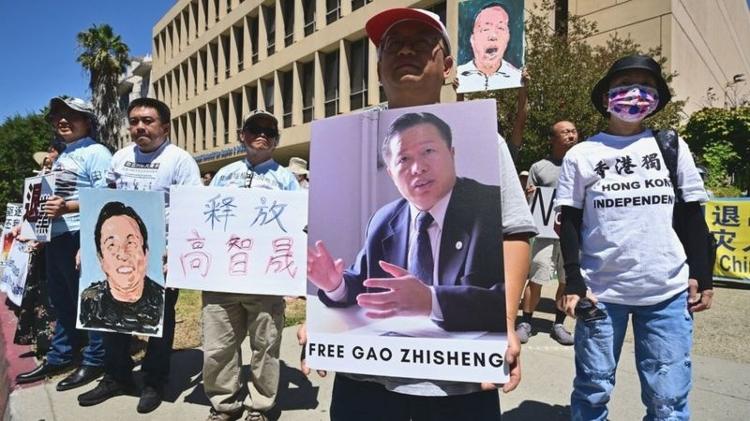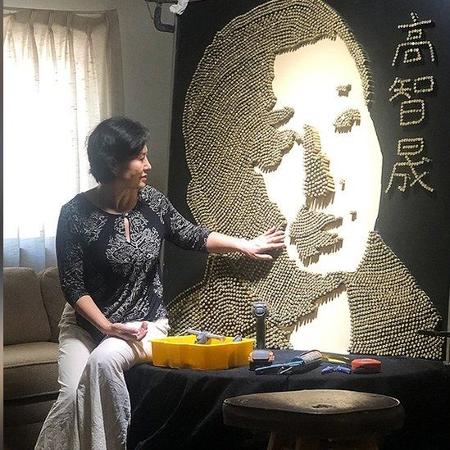Geng He was subjected to persecution, surveillance, and left his family without committing any crimes. His story reveals the dark side of China under Xi Jinping, who has just secured his third term as the country’s leader.
Geng He was subjected to persecution, surveillance, and left his family without committing any crimes. His story reveals the dark side of China under Xi Jinping, who has just secured his third term as the country’s leader.
Geng He remembers exactly where he was when he realized the overwhelming power of the Chinese state. He took his daughter Grace for a haircut at a beauty salon in Beijing.
Suddenly, dozens of people entered the building and told the mother and daughter to go with them. He was the secret police.
- Chinese propaganda hints at how Xi Jinping sees the country’s future
- Xi Jinping Becomes China’s Most Powerful Leader After Mao Zedong
At first, Geng He didn’t understand what was going on or who the people were. First he asked if they could finish the haircut but they wouldn’t let me. There were more officers on the street outside; says the others are waiting for them in their buildings.
The family’s apartment was searched and Geng He was informed that her husband had been arrested while visiting his sister in Shandong province, a few hours south of the capital. It was 2006, and it was the beginning of the end of family life.
Geng He’s husband, Gao Zhisheng, was a lawyer. She had already been honored by the communist government, but then she started defending people the authorities didn’t want to defend.
These included followers of the banned spiritual movement, Falun Gong, Chinese Christians accused of preaching without permission, and people fighting against land grab by local authorities.
After his arrest, Gao Zhisheng spent the next several years – accused of inciting destruction – or under house arrest.
For house arrest, the police set up a special police station in the couple’s apartment to more easily monitor the couple 24 hours a day.
Geng He says, “Sometimes, I would open the curtains to see how many police cars were downstairs,” and my husband said, “What are you doing? Why should they have the pleasure of looking at them?””
The situation became more and more intolerable. Authorities forced the couple to relocate, and so they had a hard time finding a school willing to accept Grace.
The situation eventually forced Geng He to make the dire choice of fleeing China with then-16-year-old Grace and their 5-year-old son Peter – but she left her husband behind.
“I felt bad about having to choose between my husband and my children – and I chose my children,” she said, unable to hold back her tears.
The trio escaped in 2009 with the help of human rights activists. Geng He and her husband had already agreed to try to escape, but their departure was so hasty that they left without telling her.
Geng He did not want to reveal the details of his journey to freedom as it could endanger others who should follow the same path. But the trip involved some time spent in the trunk of a bus.
The family was taken from China to Thailand. While there, the United States agreed to grant them asylum.
Life in the United States was initially difficult. Geng He struggled with a different language and continues to do so. She is constantly worried about her children.
Understandably, it was very difficult for them to escape without their father. Grace needed to be treated at the hospital for mental health issues.
Thirteen years later, the boys finally came to terms with their past and started their own lives in America. Grace, now 28, is newly married, and 19-year-old Peter has been accepted into a university to study medicine.
“Every day is optimistic and happy. She is studying and has a job. It’s all very promising,” said the proud mother.
Torture, disappearances and suicides
Gao Zhisheng has suffered greatly in prison and prison, where he says he was tortured, since his family fled to the United States. By the time he finished his sentence in 2014, he was in poor physical and mental health – his teeth were literally falling out.
At the end of his sentence, Gao Zhisheng was again placed under house arrest in his hometown in northern Shaanxi province, despite allegedly being a free man.
This is an example of what an American expert on Chinese law calls “liberation from salvation”.
Geng He would sometimes call her husband to find out how he was doing. Then, five years ago, she spoke to him for the last time.
“I don’t remember exactly what we were talking about because it felt like just another phone call, but of course I asked how it was,” she said. “His mood was good. He said he was fine. That’s how he was, always confident and positive.”
When he called back a few days later, no one answered. She has not heard from her husband since and does not know whether he is alive or dead.
But he fears the worst.
“I have a nightmarish feeling that the communist party will use COVID as an excuse to eradicate it forever.”
She fears that the Chinese authorities will announce that her husband died of the disease; it’s a natural death that will free them from any responsibility.
The Chinese embassy in London did not respond to the BBC’s questions about Gao Zhisheng.
It wasn’t just the lawyer who suffered. The campaign against him also included other members of his family still living in China.
His older sister, who was first kept at home, later became depressed and committed suicide two years ago.
Geng He’s brother-in-law suffered a similar fate. He fell seriously ill, but was unable to receive proper medical treatment because the police stole the identity cards of Gao Zhisheng’s relatives. He also committed suicide.
a stranger in the dark
A few years ago, a stranger suddenly appeared in the garden of Geng He’s home in San Francisco. It was difficult to see well in the dark, but fearing that he might be someone connected to the Chinese authorities, he took the gun he had been keeping at home and fired a warning shot. It had the desired effect – the stranger fled.
But Geng He was not shaken. With the lives of the children at stake, she turned her attention to her husband, whose situation was slowly losing public attention both in China and abroad.
He devoted himself to finding his whereabouts and campaigning to ensure his name was never completely lost. In August, to mark the fifth anniversary of his disappearance, he projected an image of Gao Zhisheng’s face outside the Chinese consulate in Los Angeles, and in September unveiled a statue of his face made from more than 7,000 blanks.
She has hired lawyers in Beijing to see if they can follow her husband, but no government department is releasing any information.
Geng He is one of dozens of Chinese in North America trying to free their loved ones in China.
It’s hard to know how many activists are imprisoned in China, as Beijing doesn’t even admit to having political prisoners.
Geng He claims that her husband didn’t really understand the dangers of his job until he moved to the United States. Although they were probably separated for the rest of their lives, he now feels closer to her in some ways.
“Now I feel like a colleague fighting shoulder to shoulder with him. It has given my life a new meaning,” she says.
Against a force as powerful as the Chinese Communist Party, Geng He’s campaign seems doomed to fail. But he is determined to continue.
“My own family has suffered a lot, but I feel like I’ve gained an even bigger family. I’ve met so many people who are working hard for a better China.”
The guilt of leaving her husband behind with an unknown fate will probably never go away. But she can be a beacon of hope in her children’s success, her new friends, and her belief in a better future.
– This text was published at https://www.bbc.com/portuguese/internacional-63679799.
source: Noticias
Mark Jones is a world traveler and journalist for News Rebeat. With a curious mind and a love of adventure, Mark brings a unique perspective to the latest global events and provides in-depth and thought-provoking coverage of the world at large.

